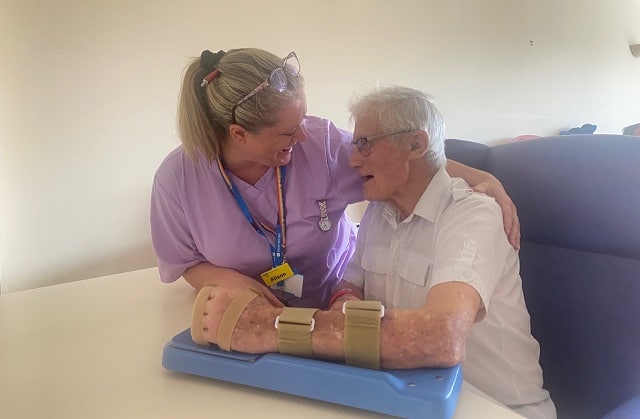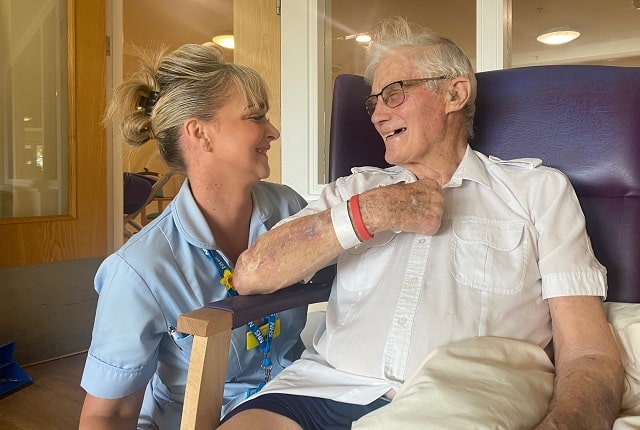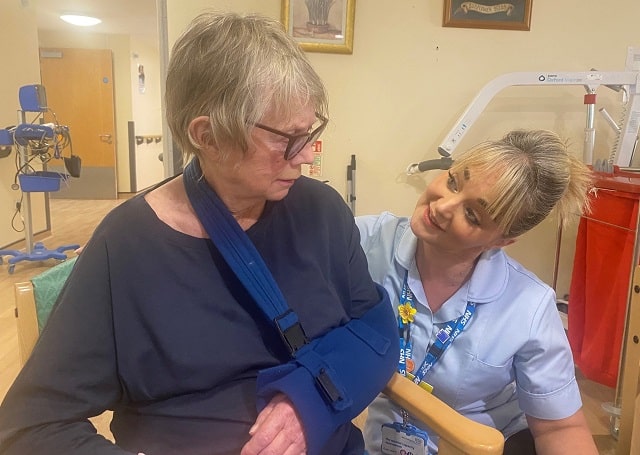
Getting back to work on his farm is the goal for 92-year-old Anthony Sinden, the first patient at a new specialist stroke rehabilitation unit in Thanet.
Anthony, from New Romney, was changing an engine in his lawnmower when he suffered a stroke, leaving him with reduced mobility on his left side.
His son rushed him to an emergency department and Anthony remained in hospital for several weeks before being transferred to the new Stroke Rehabilitation Unit, at Westbrook House, Margate.

The unit, which is run by Kent Community Health NHS Foundation Trust (KCHFT), provides round-the-clock care, seven days a week and opened this month.
Anthony said: “Although I want to get back to my farm, this is the best place for me to be at the moment. The care is great and the therapy is helping me to get stronger. It feels like it is working and helping me get back to my old self.”
At the centre, patients are supported on their road to recovery and independence, with a daily programme of therapy tailored to their individual needs. This includes supporting people to improve their mobility and regain skills such as washing, dressing, eating meals and communicating, helping them to return home.

The KCHFT unit works closely with the acute stroke unit at Kent and Canterbury Hospital. People who no longer need to be in an acute hospital, but are not yet ready to go home, will have a short period of specialist inpatient rehabilitation.
The centre has two matrons, Tracey Brown and Patricia Funnell, and is run by a specialist multi-disciplinary team, including nurses, physiotherapists, occupational therapists and dietitians, who will help patients to regain their independence after a stroke.
Tracey said: “It’s a new centre and a new team and we are very excited. There is nothing else like this in this part of Kent. Our aim is to help patients become as independent as possible, to help them go home.”
Patricia said: “We’ll work closely with families. We’re very near the beach and we have wheelchairs, so it may be that families could help take relatives to visit the beach during their recovery.
“During the summer, we’ll have garden parties and we’re looking at animal therapy too, while all the time bearing in mind that stroke patients can get tired very easily as they recover.”

Sheila Hunter, 80, from Ashford, is eager to return to her busy and active life. Before the stroke, Sheila, a retired retail manager, would go out every day of the week, enjoying an active over 55s club, meeting her walking friends, darts and ten-pin bowling.
Sheila, a great-grandmother, said: “I want to be able to walk around and be independent again. I might not be able to go for a walk with my friends, but I want to be able to get on a bus to town to meet them for a coffee.
“The team is helping me walk around and giving me exercises to do and I am making progress. It also helps talking to other people on the ward who have been through exactly the same thing.”
In preparation for the opening, members of the new team took part in activities to develop their insight into what it would be like to do every day tasks with one side of the body working less well and how difficult things can be with impaired vision – just some of the possible impacts of having a stroke.

These activities saw them put on special glasses, to replicate visual field loss. They also used muscle strengthening gym equipment, to see how tiring it can be. They tested some of the specialist equipment, including knives and forks which have been made for people who have had a stroke and a gadget to help people do buttons up.
Georgina Underwood, an assistant practitioner in stroke, said: “The activities gave a good insight into what it is like for a person who has had a stroke. We also spoke about families and carers, as the person who has the stroke is like a stone thrown into water, which then causes a ripple effect.”
The team is working in a different way, based on the Trondheim Model from Norway, which involves being one team, rather than being segregated into professions.
KCHFT Assistant Director of Community Hospitals Louise Ward, said: ”We are delighted to be opening a community-based stroke rehabilitation unit for local people in Thanet and beyond. For many people, rehabilitation after stroke is critical in their recovery journey, to give them the best quality of life.”

Stroke Association Service Delivery Lead Tara Lakin said: “This is a much-needed unit for stroke survivors in Kent. New community hospital beds will mean an easier path from an acute hospital for more people and deliver rehab for people who are not yet able to return home, or live independently.
“We have a stroke recovery service and will work together to make sure patients and carers have joined up care to ease the burden of the impact of stroke. Stroke can be devastating and collectively, stroke services can ensure people can rebuild their lives, with the right services in place.”
Consultant Stroke Physician with East Kent Hospitals University NHS Foundation Trust (EKHUFT) and national stroke advisor David Hargroves added: “Through the collaboration between Kent Community Health, East Kent Hospitals, Kent and Medway Integrated Stroke Delivery Network (ISDN) and the third sector, we are together meeting the needs of stroke survivors, closest to home, while they continue their recovery journey after an acute hospital stay.”

